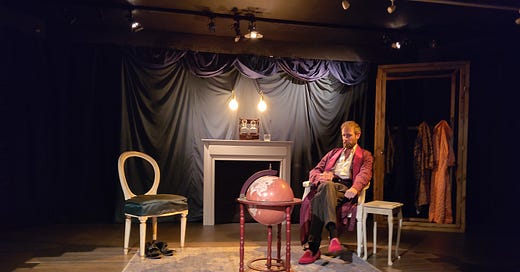When Atlas Met Tantalus @ Greenwich Theatre - Review
A tender, achingly sad vignette with an astounding lead. ★★★★★
Runs until 24th August at Greenwich Theatre studio.
Tickets £15.
Rating: ★★★★★
When Atlas Met Tantalus is only an hour long, but it uses that hour with absolutely superb efficiency. Set in real time, an hour in the parlour of a Victorian gentleman, we are whisked through impressive reflections on class, queerness, community, loneliness and love, enough to get the point but never overdone or to the point of being patronising.
The play starts with a cold open. From doors, James Cartwright (played by Lucas Livesey) is waiting in his parlour for guests. From the start, Livesey is an impeccable actor. Ten minutes of sitting alone and silent on the stage while an audience settles down are coloured with no awkwardness, and he effortlessly captures the wit and bravado of a Victorian gentleman dandy. Not once does he slip into stereotype or something more modern, inhabiting the role with believability rarely seen on the stage.
The set and costuming is fantastically done for such a small and limited run. Minimalistic and natural, everything has it’s place and there’s been no attempt at glamour. Costumes are simple and unpretentiously Victorian, and give us a hint at the characters’ personalities without falling into cliche.
The audience, especially the queer audience, are consistently reminded of how far we have come, but without a hint of preachiness. The dialogue is natural and realistic throughout, none of the comments about martyrdom or the triviality of homophobia feel aimed at the audience, the effect is similar to that of reading the correspondence of long-dead lovers, a bittersweet reminder that people fought and died for progress, it was not the natural march of history.
Atlas and Tantalus are not, in a traditional sense, a romantic pairing. There is flirtation, suggestive thigh touching, but that is as far as it goes. James is spoken for, Edwin clearly not ready. Overwhelmingly, these are men platonically finding solace in being able to be open with one another, the flirtation only natural. It is a tremendously realistic depiction of queer friendship.
Tiff Milner, writer, is an absolute dialogue powerhouse. They perfectly capture Victorian language, the awkward social climbing of a simple clerk excellently juxtaposed against the foppish man of leisure. The abbreviation of the pearly gates to simply “pearlies” is an especially fantastic touch.
What ties together the absolute genius of When Atlas Met Tantalus is the extent to which it trusts the audience. We are not handheld through queer history, references to the classics or the saints, meaning is left just under the dialogue for us to unearth, no doubt in a way that is slightly different for each of us. A nerdy understanding of the basics of the Western literary canon will help, but the emotion and meaning of the play does not rely on context.




